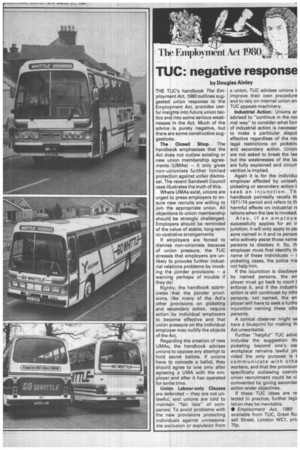The Employment Act 1980, 4 , ,
Page 33

If you've noticed an error in this article please click here to report it so we can fix it.
TUC: negative response
by Douglas Ainley THE TUC's handbook The Employment Act, 1980 outlines suggested union response to the Employment Act, provides useful insights into future union tactics and into some serious weaknesses in the Act. Much of the advice is purely negative, but there are some constructive suggestions.
The Closed Shop. The handbook emphasises that the Act does not outlaw existing or new union membership agreements (UMAs) — it only gives non-unionists further limited protection against unfair dismissal. The recent Sandwell Council case illustrates the truth of this.
Where UMAs exist, unions are urged to press employers to ensure new recruits are willing to join the appropriate union. All objections to union membership should be strongly challenged. Employers should be reminded of the value of stable, long-term co-operative arrangements.
If employers are forced to dismiss non-unionists because of union pressure, the TUC stresses that employers are unlikely to provoke further industrial relations problems by invoking the joinder provisions — a warning perhaps of trouble if they do!
Rightly, the handbook appreciates that the joinder provisions, like many of the Act's other provisions on picketing and secondary action, require action ' by individual employers to become effective and that union pressure on the individual employer may nullify the objects of the Act.
Regarding the creation of new MIAs, the handbook advises unions to oppose any attempt to hold secret ballots. If unions have to concede a ballot, they should agree to one only after agreeing a UMA with the employer and after it has operated for some time.
Union Labour-only Clauses are defended — they are not unlawful, and unions are told to maintain "fair lists" of companies. To avoid problems with the new provisions protecting individuals against unreasonable exclusion or expulsion from
a union, TUC advises unions t improve their own procedure and to rely on internal union an TUC appeals machinery.
Industrial Action: Unions ar advised to "continue in the noi mal way" to consider what forr of industrial action is necessar to make a particular disput effective regardless of the ne% legal restrictions on picketin. and secondary action. Union are not asked to break the lavi but the weaknesses of the la% are fully explained and circurr vention is implied.
Again it is for the individuE employer affected by unlawft picketing or secondary action t seek an injunction. Th handbook pointedly recalls th 1971/74 period and refers to th harmful effects on industrial rE lations when the law is invoked.
Also, if an employe successfully applies for an ir junction, it will only apply to pei sons named in it and to person who actively assist those name persons to disobey it. So, th employer must first identify th name of these individuals — i picketing cases, the police ma not help him.
If the injunction is disobeye by named persons, the err ployer must go back to court t enforce it, and if the industrii action is still continued by othE persons, not named, the err ployer will have to seek a furthE injunction naming these othE persons.
A cynical observer might se here a blueprint for making th Act unworkable.
Further "helpful" TUC advic includes the suggestion thE picketing beyond one's ow workplace remains lawful pr vided the only purpose is t communicate with othe workers, and that the provision specifically outlawing coerciv union recruitment could be ci cumvented by giving secondar action wider objectives.
If these TUC ideas are re lected in practice, further legii lation may be inevitable.
• Employment Act, 1980 available from TUC, Great Ru: sell Street, London WC1, pric 75p.












































































































